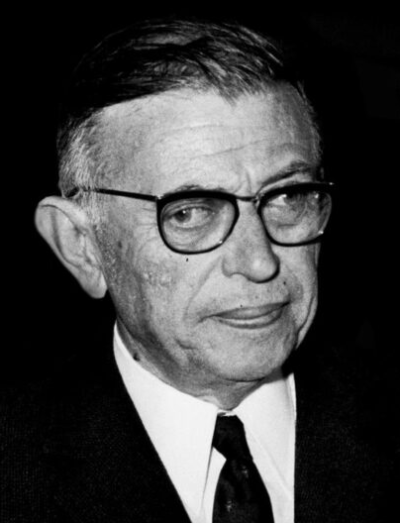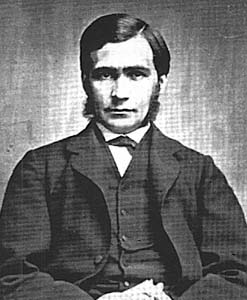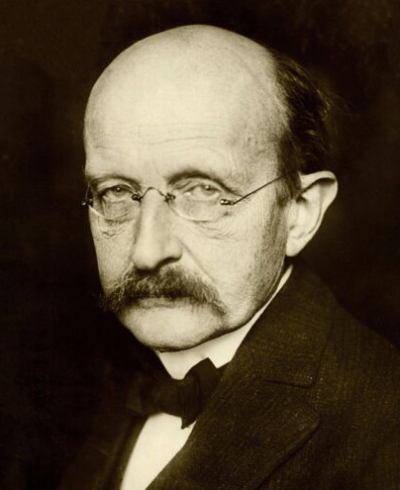Sartre: Vanguard of Existentialism – What does “Existence precedes essence” mean? Its philosophy and influence
イントロダクション
フランスの哲学者ジャン=ポール・サルトルは、実存主義の旗手として知られています。
彼は「実存は本質に先立つ」という言葉でその思想を表現しました。
つまり、私たちの存在が先にあり、その後に本質や意味が生まれるという考え方です。
この思想は、人間の自由や責任を重んじ、個々の人間が自らの選択によって自己を創造することを主張します。
サルトルの実存主義は、戦後の哲学や文学に大きな影響を与えました。彼の思想は、人間の存在や自由意志について新たな視点を提供し、多くの人々に影響を与え続けています。
Introduction
Jean-Paul Sartre, a French philosopher, is renowned as a leading figure of existentialism.
He expressed his philosophy with the phrase “Existence precedes essence.”
In essence, this idea posits that our existence comes before any essence or meaning is established.
This philosophy values human freedom and responsibility, advocating that individuals create themselves through their own choices.
Sartre’s existentialism has had a profound impact on post-war philosophy and literature. His thoughts offer new perspectives on human existence and free will, continuing to influence many people to this day.
サルトルとは?
サルトルは実存哲学の代表者であり、20世紀の思想家として知られています。
彼はフランスの哲学者であり、小説家でもありました。
サルトルは人間の存在に焦点を当て、自由意志や責任について考察しました。
彼の思想は「実存は本質に先立つ」という言葉で象徴されます。
この言葉は、人間が自らの存在を自由に選択し、その選択に責任を持つことを意味しています。
サルトルの思想は政治や文学にも大きな影響を与えました。
彼の主要な著作には『存在と無』や『嘔吐』などがあります。
サルトルの思想は今でも多くの人々に影響を与え続けています。
サルトルの生涯
サルトルは20世紀のフランスの哲学者であり、実存哲学の代表者として知られています。
彼は1905年に生まれ、1980年に亡くなりました。
彼の生涯は思想の発展と密接に関連しています。
サルトルの主要な著作の一つは『存在と無』です。
この中で彼は「実存は本質に先立つ」という有名な言葉を述べています。
彼は人間の存在が本質や目的に先立つことを強調し、個々の人間が自らの存在を自由に選択することが重要だと主張しました。
また、彼の著作『嘔吐』や『幸福とは何か』も注目されています。
これらの著作は人間の自由と責任、他者との関係性などについて探求しています。
サルトルの思想は現代の哲学や文学に大きな影響を与えました。
彼の実存主義の考え方は、自由意志や個々の存在の重要性を強調し、社会的な制約や権威に対抗する姿勢を持つ人々に影響を与えました。
サルトルの生涯は彼の思想の形成と発展と密接に関連しています。
彼の主要な著作は実存主義の基礎を築き、現代の哲学や文学に大きな影響を与えました。
彼の思想は今日でも多くの人々に影響を与え続けています。
サルトルの主要著作
サルトルとは、実存主義の代表的な思想家であり、フランスの哲学者です。
彼は20世紀の哲学界において大きな影響力を持っていました。
サルトルの生涯
サルトルは1905年にパリで生まれました。
彼は学生時代から優れた才能を発揮し、哲学の道に進むことを決意しました。
彼はパリ大学で哲学を学び、後に教授となりました。
サルトルの主要著作
サルトルは数々の重要な著作を残しました。
その中でも特に有名なのは『存在と無』や『嘔吐』、『幸福の根源』などです。
これらの著作は実存主義の基礎を築くものであり、人間の存在や自由意志について深く考察しています。
サルトルの主要著作は、実存主義の思想を広める上で重要な役割を果たしました。
彼の思想は多くの人々に影響を与え、現代の哲学や文学にも大きな影響を与えています。
Introduction
Who is Sartre?
Jean-Paul Sartre is renowned as a leading figure of existentialism, a prominent 20th-century thinker from France.
He was both a philosopher and a novelist, focusing on human existence, free will, and responsibility.
His philosophy is symbolized by the phrase “Existence precedes essence,” which emphasizes that individuals freely choose their existence and bear responsibility for their choices.
Sartre’s ideas have had significant influences in politics and literature, with major works such as “Being and Nothingness” and “Nausea.”
His philosophy continues to influence many people today.
Sartre’s Life
Jean-Paul Sartre was a 20th-century French philosopher and a leading figure in existentialism.
He was born in 1905 and passed away in 1980.
His life is closely tied to the development of his philosophy.
One of Sartre’s major works is “Being and Nothingness,” where he famously stated, “Existence precedes essence.”
He emphasized that human existence precedes any essence or purpose, asserting the importance of individuals freely choosing their existence.
His works “Nausea” and “What is Literature?” are also notable contributions.
These works explore human freedom, responsibility, and relationships with others.
Sartre’s philosophy has had a profound impact on modern philosophy and literature.
His existentialist ideas emphasize the importance of free will and individual existence, influencing those who oppose societal constraints and authority.
Sartre’s life was closely intertwined with the formation and development of his philosophy.
His major works laid the foundation of existentialism and had a profound influence on contemporary philosophy and literature.
His ideas continue to influence many people today.
Key Works by Sartre
Sartre, a representative thinker of existentialism, was a French philosopher known for his significant influence in the 20th-century philosophical realm.
Sartre’s Life
Sartre was born in Paris in 1905.
From his student days, he displayed exceptional talent and was determined to pursue philosophy.
He studied philosophy at the University of Paris and later became a professor.
Key Works by Sartre
Sartre left behind numerous important works.
Among these, particularly famous ones include “Being and Nothingness,” “Nausea,” and “The Roots of Happiness.”
These works laid the foundation of existentialist thought, deeply examining human existence and free will.
Sartre’s key works played a crucial role in spreading existentialist philosophy.
His ideas influenced many people and had a significant impact on modern philosophy and literature.

In 1955, Simone de Beauvoir and Jean-Paul Sartre in Beijing
実存主義とは何か?
実存主義とは、人間の存在や自由意志、個人の責任に焦点を当てた哲学の一派です。
この思想は、フランスの哲学者ジャン=ポール・サルトルを中心に展開されました。
実存主義は、人間の存在が本質に先立つと考えます。
つまり、人間は自らの存在を通じて意味や価値を創り出し、自由に選択することができるということです。
実存主義の特徴は、個人の自由や責任を強調することです。
人間は自らの選択によって自分自身を作り上げることができるとされ、その選択には責任が伴います。
また、実存主義は人間の孤独や不安、絶望にも着目します。
人間は自由を持つが故に、自己の存在や他者との関係において不安や絶望を感じることがあるとされます。
実存主義の起源は、19世紀のデンマークの哲学者キェルケゴールにまで遡ります。
彼は、信仰の個人的な体験や絶対者との関係を重視しました。
その後、20世紀に入り、サルトルやアルベール・カミュなどの哲学者たちが実存主義を発展させました。
実存主義は、文学や演劇、映画などの芸術にも大きな影響を与えました。
特にサルトルは、小説や戯曲を通じて実存主義の思想を広めました。
彼の代表作である『嘔吐』や『閉ざされた道』は、実存主義の思想を具体的に描いた作品として知られています。
実存主義は、現代の哲学や倫理学においても重要な位置を占めています。
人間の存在や自由意志について考える上で、実存主義の視点は貴重なものです。
実存主義の定義と特徴
実存主義とは、人間の存在そのものを重視し、その個々の存在が本質に先立つという哲学的な立場です。
実存主義の代表者であるサルトルは、「実存は本質に先立つ」という言葉でその思想を表現しました。
実存主義の定義と特徴は以下のようなものです。
まず、実存主義は人間の自由を重視します。
人間は自由な存在であり、自分自身の選択に責任を持つべきだと考えられています。
また、実存主義は人間の孤独を認識します。
人間は他者との関係の中で生きている一方で、自分自身との対話や内省も必要です。
孤独を受け入れ、自己を見つめることが重要とされます。
さらに、実存主義は不安や絶望を扱います。
人間は不確実性や死の存在に直面することで不安を感じるものですが、それを受け入れることで真の自由を見出すことができるとされています。
実存主義の起源は19世紀のドイツにまで遡りますが、フランスのサルトルがその思想を広めました。
彼は文学や哲学を通じて実存主義を発展させ、多くの人々に影響を与えました。
実存主義は人間の存在や自由、不安といった根源的な問いに向き合い、それらを解決するための哲学的な枠組みを提供します。
サルトルをはじめとする実存主義の代表者たちは、人間の自己の意味を見出すために、常に自問自答を続けました。
実存主義の起源と発展
実存主義は、20世紀の哲学者ジャン=ポール・サルトルを中心に発展した思想です。
サルトルは実存主義の代表者として知られており、その思想は哲学界に大きな影響を与えました。
実存主義は、人間の存在そのものに焦点を当てる思想です。
実存主義の定義や特徴は様々ありますが、一般的には「実存は本質に先立つ」という考え方が重要なポイントです。
つまり、人間は自らの存在を通じて自由を持ち、自らの意志で自己を創造することができるとされています。
実存主義の起源は、19世紀のドイツの哲学者カール・ヤスパースにまで遡ることができます。
ヤスパースは「存在哲学」という言葉を初めて用いた人物であり、実存主義の基礎を築きました。
その後、サルトルをはじめとする多くの哲学者が実存主義を発展させ、独自の思想を展開していきました。
実存主義は、第二次世界大戦後の社会情勢や哲学的な問いに対する反応として広まりました。
戦争や人間の苦悩、自己の意味や目的についての追求が、実存主義の発展に大きく寄与しました。
実存主義は、個人の自由や責任、自己の存在に対する真摯な向き合い方を提唱しています。
その影響は哲学だけでなく、文学や芸術、政治などにも及びました。
実存主義は、人間の存在そのものについて深く考えるきっかけを与え、多くの人々に影響を与え続けています。
Existentialism: What is it?
Existentialism is a philosophical movement that focuses on human existence, free will, and individual responsibility.
This philosophy was primarily developed around the French philosopher Jean-Paul Sartre.
Existentialism posits that human existence precedes essence.
In other words, it emphasizes that humans create meaning and value through their own existence and have the freedom to choose.
A key characteristic of existentialism is its emphasis on individual freedom and responsibility.
It argues that individuals can create themselves through their choices and must take responsibility for those choices.
Existentialism also addresses human solitude, anxiety, and despair.
It acknowledges that the freedom of human existence can lead to feelings of isolation and existential angst.
The origins of existentialism can be traced back to the 19th-century Danish philosopher Søren Kierkegaard, who emphasized personal experience of faith and the relationship with the Absolute.
In the 20th century, existentialism was further developed by philosophers such as Sartre and Albert Camus.
Existentialism has also had a profound impact on literature, theater, and film.
Particularly, Sartre spread existentialist ideas through novels and plays.
His works like “Nausea” and “No Exit” vividly depict existentialist themes.
Existentialism continues to hold a significant place in contemporary philosophy and ethics.
Its perspective on human existence, free will, and existential dilemmas remains valuable in understanding these fundamental aspects of human life.

Sartre Visits Cuba and Meets Che Guevara Alongside Beauvoir (1960)
サルトルの実存主義
サルトルは実存主義の代表的な哲学者であり、その思想は多くの人々に影響を与えてきました。
「実存は本質に先立つ」とは?
サルトルの実存主義の重要な概念の一つは、「実存は本質に先立つ」というものです。
これは、人間の存在が本質や目的に先立つという意味です。
つまり、人間は自らの存在を通じて自由に自己を創造し、意味を持たせることができるという考えです。
サルトルの実存主義思想の特徴
サルトルの実存主義思想には以下のような特徴があります。
まず、自由と責任の概念が重要です。
サルトルは人間が自由であることを強調し、自由な選択によって自己を創造することができると主張しました。
しかし、その自由には責任が伴うとも考えています。
自由な選択をすることで、自己の存在や他者の存在に対して責任を持つ必要があるということです。
また、不条理や無意味さに向き合うことも重要なテーマです。
サルトルは人間の存在には不条理さや無意味さがつきものであると考えており、それに向き合うことが重要だと主張しました。
人間は自らの存在に意味を与えることで、不条理さや無意味さに立ち向かうことができるという考えです。
以上が、サルトルの実存主義の概要です。
彼の思想は、人間の自由や責任、不条理さに向き合う姿勢などを通じて、多くの人々に影響を与えてきました。
Sartre’s Existentialism
Jean-Paul Sartre is a prominent philosopher known for his existentialist ideas, which have deeply influenced many.
What Does “Existence Precedes Essence” Mean?
One of the fundamental concepts in Sartre’s existentialism is “existence precedes essence.”
This means that human existence comes before any inherent essence or purpose.
In other words, humans are free to create and imbue meaning into their own existence through their choices.
Key Features of Sartre’s Existentialist Thought
Sartre’s existentialist philosophy encompasses several key features:
Firstly, the concepts of freedom and responsibility are paramount.
He emphasizes that humans are inherently free and capable of creating themselves through free choices.
However, this freedom also entails responsibility for one’s own existence and relationships with others.
Additionally, grappling with absurdity and meaninglessness is crucial.
Sartre argues that human existence is often accompanied by absurdity and meaninglessness, and confronting this reality is essential.
By imbuing their existence with meaning, humans can confront and transcend absurdity and meaninglessness.
This overview encapsulates the essence of Sartre’s existentialism.
His ideas, which address human freedom, responsibility, and grappling with the absurd, have profoundly impacted many individuals.

In 1967, Sartre (second person from the left in the front row) with Simone de Beauvoir on his right.
「実存は本質に先立つ」とは?
実存主義の代表者として知られるサルトルについて、彼の思想の中でも重要な概念である「実存は本質に先立つ」という言葉について解説します。
「実存は本質に先立つ」とは、サルトルの実存主義の基本的な考え方の一つです。
彼は人間の存在が本質に先立つと主張しました。
つまり、人間は自らの存在を通じて自由に自己を創造し、意味を与えることができるということです。
サルトルは、人間は生まれながらにして何か特定の本質を持っているわけではなく、自己の意志によって自分自身を創造する存在だと考えました。
そのため、人間は自由意志を持ち、自らの選択や行動に責任を持つべきだと主張しました。
この実存主義の思想は、人間の自由と責任を重視する点が特徴です。
サルトルは、人間が自己の存在を通じて自由に意味を生み出すことができると考え、その自由が個々の人間の責任を伴うものであると述べました。
また、サルトルは実存主義を通じて、人間の孤独や不安といった存在の根源的な問題にも取り組みました。
彼は、人間は他者との関係を通じて自己を確立し、自己を超えることができると考えました。
人間は他者との関わりの中で自己と他者を同時に実現することができるのです。
サルトルの実存主義は、人間の自由と責任、他者との関係性を重視した思想です。
彼の考え方は現代の個人の自己実現や社会のあり方にも大きな影響を与えています。
サルトルの実存主義思想の特徴
サルトルは実存主義の代表者として知られています。
彼の実存主義思想の特徴について見ていきましょう。
まず、サルトルの実存主義の根本的な考え方は、「実存は本質に先立つ」というものです。つ
まり、人間は自らの存在を通じて自己を創造し、本質や目的を持つのではなく、まずは存在していることが大切だと主張しています。
この考え方は、人間の自由意志や責任を重視するという点で特徴的です。
サルトルは、「人間は自由であり、自らの選択によって自己を作り上げる」と考えています。
彼によれば、人間は自己の存在に対して責任を持ち、自らの選択によって自己を形成することが求められるのです。
また、サルトルは「他者との関係」というテーマも重要視しています。
彼によれば、他者との関わりは人間の存在において欠かせないものであり、他者との関係を通じて自己を確立することができると考えています。
以上が、サルトルの実存主義思想の特徴です。
彼の考え方は、人間の自由と責任、他者との関係性に焦点を当てており、その影響は哲学や文学など多岐にわたっています。
Here’s the English translation of the provided text:
“What does ‘Existence precedes essence’ mean?”
Explaining the concept pivotal to Sartre, renowned for his existentialist philosophy.
“‘Existence precedes essence’ is a fundamental idea in Sartre’s existentialism.
He argued that human existence precedes any predetermined essence.
In essence, humans create themselves freely through their own existence, imbuing it with meaning.
Sartre believed humans are not born with a predetermined essence but create themselves through their own choices.
Therefore, he emphasized human freedom, asserting that individuals are responsible for their choices and actions.
Existentialism highlights human freedom and responsibility, addressing fundamental existential issues such as solitude and anxiety.
Sartre proposed that through relationships with others, individuals establish and transcend themselves simultaneously.
His philosophy underscores human freedom, responsibility, and interpersonal relationships, influencing modern concepts of self-realization and societal dynamics.”
サルトルの実存主義の影響
サルトルの実存主義は、文学や芸術、そして現代哲学に大きな影響を与えました。
まず、文学や芸術への影響です。
サルトルは、「存在は本質に先立つ」という考えを持ち、人間が自由に選択をすることによって自己を創造すると主張しました。
この考え方は、作家や芸術家にとって大きなインスピレーションとなりました。
彼らは自己の存在を表現するために、自由な選択と創造を追求しました。
また、サルトルは個人の自由と責任を重視し、社会的な制約や権威に対して批判的でした。
この考え方は、芸術においても反骨精神や自己表現の重要性を強調する要素となりました。
次に、現代哲学への影響です。
サルトルの実存主義は、人間の自由と責任を中心に据えた哲学であり、その思想は現代の哲学に大きな影響を与えました。
彼の考え方は、人間の存在や意味についての問いに対して新たな視点を提供しました。
また、サルトルは人間の自由と責任を強調することで、社会や政治における個人の役割や責任を考えるきっかけとなりました。
そのため、現代の哲学者や思想家は、サルトルの実存主義に触発されて自己の存在や社会的な問題について深く考えるようになりました。
サルトルの実存主義は、文学や芸術、そして現代哲学に大きな影響を与えました。
彼の考え方は、自由と責任を重視し、個人の存在や意味について新たな視点を提供しました。
その影響は現代においても続いており、多くの人々に影響を与えています。
文学や芸術への影響
サルトルは実存主義の代表者として、文学や芸術に深い影響を与えました。
彼の思想は、個人の自由と責任、存在の根源的な不安に焦点を当てており、これらのテーマは多くの作家や芸術家によって探求されました。
例えば、フランツ・カフカはサルトルの影響を受け、自己の存在の不確かさや社会の圧力に苦しむ主人公を描いた作品を生み出しました。
また、アルベール・カミュはサルトルと共に実存主義の代表者として知られており、彼の作品も実存主義の考え方を反映しています。
芸術においても、サルトルの実存主義は新たな表現の可能性を開拓しました。
彼の思想は芸術家たちによる実験的なアプローチを促し、伝統的な美学の枠組みを超えた作品が生まれました。
サルトルの実存主義の影響は、今日の文学や芸術にも続いています。
彼の思想は個人の自由や人間の存在の意味についての探求を助け、新たな視点や表現方法を提供しています。
現代哲学への影響
サルトルは実存主義の代表者として知られています。
彼の思想は多くの分野に影響を与えました。
まず、文学や芸術への影響です。
彼の作品は人間の存在や自由意志の問題を扱い、多くの作家や芸術家に影響を与えました。
彼の実存主義の思想は、現代の文学や芸術においても重要なテーマとなっています。
また、サルトルの実存主義は現代哲学にも大きな影響を与えました。
彼の思想は人間の自由や責任、他者との関係性など、重要な問題を提起しました。
これにより、現代の哲学者たちは新たな視点を得ることができました。
サルトルの実存主義は、哲学の領域においても大きな変革をもたらしました。
サルトルの実存主義の影響は、文学や芸術、現代哲学だけでなく、社会や個人の意識にも及んでいます。
彼の思想は人々に自己の存在や意味を問いかけ、自由な選択と責任の重要性を示しました。
そのため、彼の実存主義は今日でも多くの人々に影響を与え続けています。
Here is the English translation:
“The Influence of Sartre’s Existentialism”
“Sartre’s existentialism has had a profound impact on literature, art, and contemporary philosophy.
Firstly, its influence on literature and art:
Sartre’s assertion that ‘existence precedes essence,’ emphasizing humans create themselves freely through choices, served as significant inspiration for writers and artists.
They pursued freedom and creativity to express their own existence.
Moreover, Sartre emphasized individual freedom and responsibility, criticizing social constraints and authority, a stance that became crucial in art for its rebellious spirit and emphasis on self-expression.
Next, its impact on contemporary philosophy:
Sartre’s existentialism, centered on human freedom and responsibility, profoundly influenced modern philosophy.
His perspective provided new insights into questions about human existence and meaning.
Furthermore, by stressing human freedom and responsibility, Sartre prompted reflection on individual roles and responsibilities in society and politics.
Therefore, contemporary philosophers and thinkers have deeply contemplated their existence and societal issues inspired by Sartre’s existentialism.
Sartre’s existentialism has significantly influenced literature, art, and contemporary philosophy.
His emphasis on freedom, responsibility, and providing new perspectives on individual existence and meaning continues to resonate today.
サルトルの実存主義を理解するための推奨文献
サルトルの実存主義を理解するためには、以下の推奨文献があります。
まず、サルトルの著作としては、『存在と無』や『嘔吐』などがあります。
これらの作品は、実存主義の基本的な思想や概念を探求しています。
特に『存在と無』は、実存主義の根幹をなす存在の自由や責任について詳しく解説しています。
また、サルトルについての評論や研究書籍も参考になります。
例えば、モーリス・メルロー=ポンティによる『サルトルの哲学』や、ジャン=ポール・サルトルの自伝『幸福への道』などがあります。
これらの書籍は、サルトルの思想や彼の哲学的な背景について深く掘り下げています。
これらの推奨文献を通じて、サルトルの実存主義についてより理解を深めることができるでしょう。
彼の思想や影響を知ることは、哲学や人間の存在について考える上で貴重な知識となるはずです。
サルトルの著作
サルトルの実存主義を理解するためには、彼の著作を読むことがおすすめです。
サルトルは実存主義の代表者として知られており、その思想を深く探求するためには彼の著作を読むことが必要不可欠です。
サルトルの著作には、代表作として『存在と無』や『吐き気』などがあります。
これらの作品では、実存の重要性や自由の概念が詳細に描かれています。
また、『幸福とは何か』や『人間の尊厳について』などの哲学的な著作もあります。
さらに、サルトルについての評論や研究書籍も参考になります。
彼の思想や影響について深く考察した本は多くありますので、興味がある方はぜひ手に取ってみてください。
サルトルの著作は、彼の実存主義思想を理解するための貴重な資料です。
彼の思想に興味がある方は、彼の著作を読んでみることをおすすめします。
『存在と無』(L’Être et le Néant)は、20世紀フランスの哲学者であるジャン=ポール・サルトル(Jean-Paul Sartre)が1943年に発表した重要な著作です。この著作は、実存主義(Existentialism)の根本的な考え方や概念を探求したものであり、人間存在の意味と個人の自由に関する洞察を提供しています。
『存在と無』の内容
『存在と無』は、サルトルが「実存は本質に先立つ(Existence precedes essence)」という有名な言葉で表現したように、人間の存在が先にあり、その後に個人の本質や意味が形成されることを論じています。
彼は人間を「自由な存在」とみなし、その自由が選択と責任を伴うという考えを強調しています。人は自分の存在の全責任を負い、自らの選択によって自己を創造するという考え方が重要なテーマとなっています。
この著作では、存在の根源的な不安や孤独などの感情に焦点を当てながら、人間の自己意識や他者との関係、そして行動の自由について考察されています。
サルトルは、他者との関係においても個人の自由と責任が不可避であり、他者の視線によって自己を捉えることで自己を見つめ直すことができると論じます。
その一方で、他者の視線による制約や評価にとらわれることなく、自己の自由を維持することの重要性も強調されています。
サルトルはまた、愛や感情、義務といったテーマも探求し、これらが人間存在における選択と責任にどのように影響するかを分析しています。
人は自己の自由な選択を行う中で、自己と他者との間で緊張を抱えながら存在していると論じています。
総括すると、『存在と無』は人間存在の根源的な問いに取り組み、自己の自由と責任、他者との関係、選択の重要性などに焦点を当てながら、実存主義の基本的な原則を探求した重要な哲学的著作です。
サルトルについての評論・研究書籍
サルトルは実存主義の代表者として知られています。
彼の思想を深く理解するためには、以下の推奨文献を参考にすることをおすすめします。
まず、サルトル自身の著作が重要です。彼の代表作である『存在と無』や『嘔吐』は、実存主義の基本的な概念を探求しています。
また、『幸福の論理』では、自由と責任の問題を取り上げています。
これらの著作は、サルトルの思想の根幹を理解するために必読です。
さらに、サルトルについての評論や研究書籍も参考になります。
例えば、ミシェル・オネデールの『サルトルの哲学』は、サルトルの思想を体系的に解説しています。
また、ジャン=ポール・サルトルという人物をより深く知りたい方には、アニー・コーエン=ソルルの『サルトル伝』がおすすめです。
これらの書籍は、サルトルの実存主義についてより詳しく知るための貴重な情報源です。
以上が、サルトルの実存主義を理解するための推奨文献です。
彼の著作や評論・研究書籍を読むことで、彼の思想とその影響について深く探求することができます。
Here is the English translation:
“Recommended Literature to Understand Sartre’s Existentialism”
To understand Sartre’s existentialism, there are recommended readings that provide insight into his philosophy.
Firstly, among Sartre’s own works are “Being and Nothingness” and “Nausea.”
These works explore the fundamental ideas and concepts of existentialism.
In particular, “Being and Nothingness” extensively discusses the core of existentialism, focusing on human freedom and responsibility.
Additionally, writings and studies about Sartre are also valuable references.
For instance, Maurice Merleau-Ponty’s “The Philosophy of Sartre” and Jean-Paul Sartre’s autobiography “The Words” delve deeply into Sartre’s philosophical background.
Through these recommended readings, one can deepen their understanding of Sartre’s existentialism.
Understanding his thoughts and influence should provide valuable insights into philosophy and human existence.

“Sartre and Beauvoir’s Graves at Montparnasse Cemetery”
まとめ
サルトルは実存主義の代表的な思想家であり、実存は本質に先立つという考えを持っています。
彼の思想は哲学や文学、政治など多岐にわたり、多くの人々に影響を与えました。
実存主義は、個人の自由と責任を重視し、人間の存在の意味を問いかけるものです。
サルトルの思想は、人々に自己の存在を見つめ直すきっかけを与え、社会や世界への問題意識を高める役割を果たしています。
彼の著作や講演は今でも多くの人々に読まれ、彼の思想は広く知られています。
実存主義の旗手として、サルトルの影響は今もなお続いています。
参考文献
サルトルは実存主義の代表者として知られています。
彼の思想や影響を理解するためには、参考文献を活用することが重要です。
まず、サルトルの代表作である『存在と無』は、彼の実存主義の基本的な考え方を探求したものです。
この本は、実存主義の哲学的な概念や実存の意味について詳しく説明しています。
また、『絶望』という著書では、サルトルが人間の自由と責任に焦点を当てています。
彼は人間が自由であり、自分自身の存在を選ぶことができると主張しています。
この本は、サルトルの実存主義の思想を深く理解するために重要な参考文献です。
さらに、サルトルの思想に影響を与えた哲学者として、カール・ヤスパースやマルティン・ハイデッガーが挙げられます。
彼らの著書や論文は、サルトルの実存主義の背景や発展についての詳細な情報を提供しています。
以上が、サルトルと実存主義についての参考文献です。
これらの書籍や論文を読むことで、彼の思想や影響をより深く理解することができるでしょう。
関連項目
サルトルの実存主義の思想や影響を理解する上で、以下の関連項目も参考になります。
- カミュ:サルトルと同じく実存主義の代表者であり、友人でもありました。彼の作品にも実存主義のテーマが見られます。
- ニーチェ:実存主義の先駆者とも言える思想家で、サルトルの思想にも大きな影響を与えました。ニーチェの「神は死んだ」という言葉は、実存主義の中核をなす考え方です。
- ハイデガー:実存主義の影響を受けたドイツの哲学者で、存在と時間の関係について独自の考えを持っています。彼の思想も実存主義の理解に役立ちます。
- デカルト:「我思う、故に我あり」という言葉で知られるフランスの哲学者で、実存主義の基礎を築いたと言えます。サルトルもデカルトの思想に多く触れており、その影響は大きいです。
- フロイト:心理学の父とも言われる彼の思想は、実存主義とも関連があります。特に無意識の存在や欲望の重要性については、実存主義の考え方と共通点があります。
これらの関連項目を通じて、サルトルの実存主義の思想や影響をより深く理解することができます。
彼の思想は多くの哲学者や文化人に影響を与えたため、関連項目を探求することは非常に有益です。
Summary
Jean-Paul Sartre is a prominent existentialist philosopher who posited that existence precedes essence.
His philosophy spans across various fields including philosophy, literature, and politics, influencing many individuals.
Existentialism emphasizes individual freedom and responsibility, questioning the meaning of human existence.
Sartre’s ideas prompt individuals to reexamine their own existence and raise awareness of societal and global issues.
His works and lectures continue to be widely read, ensuring his philosophy remains widely recognized.
As a leading figure of existentialism, Sartre’s influence persists to this day.
References
Understanding Sartre’s philosophy and influence requires utilizing appropriate references.
Firstly, Sartre’s seminal works like “Being and Nothingness” explore fundamental existential concepts.
This book provides detailed explanations of existential philosophical concepts and the meaning of existence.
Additionally, “Nausea” focuses on human freedom and responsibility, asserting that humans are free to choose their own existence.
This book is an important reference for deepening one’s understanding of Sartre’s existentialist philosophy.
Furthermore, philosophers who influenced Sartre include Karl Jaspers and Martin Heidegger.
Their writings and papers offer detailed information on the background and development of Sartre’s existentialism.
These are the recommended references for understanding Sartre and existentialism.
Reading these books and papers will deepen your understanding of his philosophy and influence.
Related Topics
In understanding Sartre’s existentialist philosophy and influence, the following related topics are also valuable:
Camus: A representative of existentialism like Sartre and a friend of his. Existentialist themes can be seen in his works.
Nietzsche: A precursor to existentialism, whose ideas greatly influenced Sartre. Nietzsche’s “God is dead” encapsulates core existentialist thought.
Heidegger: A German philosopher influenced by existentialism, who has unique ideas about the relationship between existence and time. His philosophy is also helpful in understanding existentialism.
Descartes: A French philosopher known for “I think, therefore I am,” laying the foundation for existentialism. Sartre engages extensively with Descartes’ philosophy, which had a significant impact.
Freud: Often called the father of psychology, his ideas have connections to existentialism. Particularly, concepts like the unconscious and the importance of desires share common ground with existentialist thought.
Exploring these related topics will provide deeper insights into Sartre’s existentialist philosophy and influence.
His ideas have influenced many philosophers and cultural figures, making exploring related topics highly beneficial.



コメント